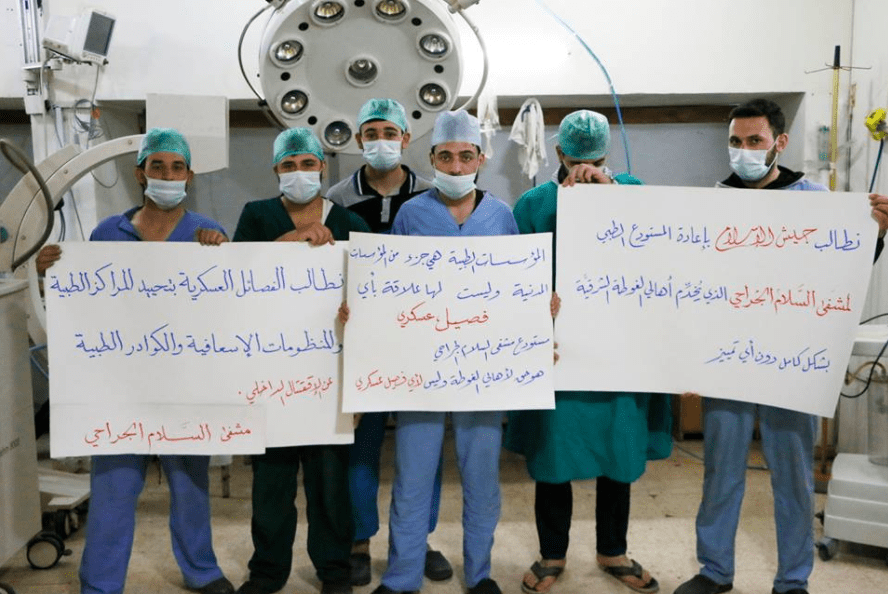Jaish al-Islam confiscates warehouse full of medical supplies, sparking days of protests by hospital staff
A hospital principally supported by Doctors Without Borders (MSF) in […]
1 June 2017
A hospital principally supported by Doctors Without Borders (MSF) in East Ghouta, an opposition enclave just east of Damascus, is now “turning away” patients after local rebels seized a warehouse containing 90 percent of the hospital’s supplies, its administrator tells Syria Direct.
Rebel faction Jaish al-Islam commandeered the a-Salam Surgical Hospital’s store of surgical tools, emergency room equipment, anesthetics and medicine late last month, after disputes between rival rebel factions in East Ghouta erupted into violent infighting.
The warehouse, located in the town of Arbin in East Ghouta’s north, was in Hayat Tahrir a-Sham (HTS) territory until the latest round of infighting, when Jaish al-Islam took control of the area.
“Masked men from Jaish al-Islam took everything,” Abu Muhammad, a-Salam Hospital’s administrator tells Syria Direct’s Majdoleen a-Zouabi and Yazan Torko.
A Jaish al-Islam spokesman denied the administrator’s accusations, telling Syria Direct on Thursday that rebel fighters took over the warehouse in Arbin because rival faction HTS were hoarding medical supplies.
“We will return [the supplies] to the people of East Ghouta as soon as possible,” says Jaish al-Islam spokesman Hamza Birqdar.
Despite days of protests demanding the supplies be returned, Jaish al-Islam has not given back any medical equipment to the hospital, which is now limited to performing basic surgical procedures.
Q: When did Jaish al-Islam confiscate the warehouse, and why?
The a-Salam Surgical Hospital was previously in Arbin, but the regime bombed and severely damaged the building. The warehouse was in the basement of the building, and was not damaged by the airstrikes.
We moved the hospital itself to the Central Section [the southern area of East Ghouta primary controlled by HTS and Failaq a-Rahman], but we left the supplies behind in the warehouse since it was a safe place. In light of the current infighting, it’s best that I don’t mention the hospital’s exact location for security reasons.
On April 28, Jaish al-Islam attacked Hayat Tahrir a-Sham [HTS] and seized control of Arbin. When we heard, the director of the Unified Medical Office in East Ghouta called members of Jaish al-Islam’s medical committee, informing them that the warehouse belongs to the a-Salam Hospital.
Dr. Abu Bakr Hakim, the director of the Jaish al-Islam’s medical committee, asked that we come to the warehouse to confirm that it belongs to the a-Salam Hospital. So, we sent the warehouse’s custodian to open the doors for them.
When they opened the door, masked men from Jaish al-Islam took everything, emptying the entire warehouse of its contents.

Q: How did the loss of the warehouse affect operations at the a-Salam Hospital?
The warehouse stored crucial operating room supplies and about 90 percent of the hospital’s consumable goods [syringes, bandages, etc.].
A lack of supplies forced the hospital to close. We reopened in mid-May, but can only do basic operations and procedures. Over the past month, we’ve turned away some patients requiring surgery—at least until we can get the hospital running again—and their conditions are deteriorating.
With the current rebel infighting, the medical situation is worsening and the number of injured residents is increasing.
A few days ago, Doctors Without Borders (MSF) gave some supplies to the hospital, but it didn’t fully meet our needs.
Q: Could you talk about the protests organized by the hospital staff? What are your demands?
Last Saturday, the medical staff of the a-Salam Surgical Hospital protested Jaish al-Islam’s seizure of the hospital’s medical warehouse. The protests ran for four days. A number of other hospitals followed suit and protested in solidarity with us.
The protests demanded that the contents of the warehouse be returned. Those supplies rightfully belong to all East Ghoutans, without exception.
Medical professionals and medical organizations must remain neutral in regards to infighting and internal conflicts.
Q: Have you contacted Jaish al-Islam to solve this issue?
We contacted the Unified Medical Office, and they spoke with Jaish al-Islam’s Medical Committee. [Jaish al-Islam] denied everything, accusing other factions of taking control of the warehouse. Jaish al-Islam also claimed that the warehouse had few supplies in it.
Jaish al-Islam’s leadership later confessed to the incident in front of several doctors in East Ghouta at a special meeting convened to discuss the topic. Still, they refused to return the warehouse’s contents, even after hospital staff presented them with a statement announcing its neutrality in the infighting.
Q: How are relations between the hospital’s administration and the factions that control the area? If a different faction took control, how would that affect the hospital?
Two days before Jaish al-Islam confiscated the warehouse, we operated on two of their fighters. Even now, if one of them needs an operation, we will provide it—we don’t discriminate.
The a-Salam Surgical Hospital has no connection to any of the factions. As for employees, like anyone else, they have various attitudes and allegiances, but this does not affect their work.
The hospital serves both civilians and military personnel free of charge. Our patients include the poor, the displaced and others. We’re completely independent, with no political or military affiliations.
Today, the hospital is trying to fulfill its duties and carry out its work, refusing to enter any political of inter-factional disputes.
In regards to another faction taking control of the area, I can’t answer this question right now. I will say that each faction brings its own system, with its own rules and its own security services—so a change in control would affect the whole region, including hospitals and medical institutions.







